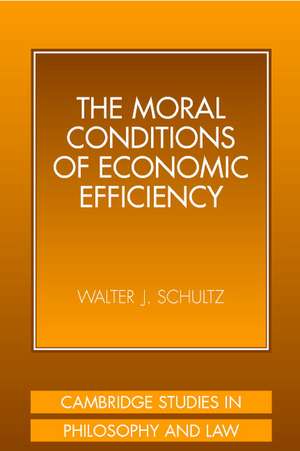The Moral Conditions of Economic Efficiency: Cambridge Studies in Philosophy and Law
Autor Walter J. Schultzen Limba Engleză Hardback – 17 iun 2001
| Toate formatele și edițiile | Preț | Express |
|---|---|---|
| Paperback (1) | 291.54 lei 6-8 săpt. | |
| Cambridge University Press – 2 ian 2008 | 291.54 lei 6-8 săpt. | |
| Hardback (1) | 688.23 lei 6-8 săpt. | |
| Cambridge University Press – 17 iun 2001 | 688.23 lei 6-8 săpt. |
Din seria Cambridge Studies in Philosophy and Law
-
 Preț: 348.39 lei
Preț: 348.39 lei -
 Preț: 176.62 lei
Preț: 176.62 lei -
 Preț: 354.41 lei
Preț: 354.41 lei -
 Preț: 322.89 lei
Preț: 322.89 lei -
 Preț: 283.79 lei
Preț: 283.79 lei -
 Preț: 444.08 lei
Preț: 444.08 lei - 11%
 Preț: 690.27 lei
Preț: 690.27 lei -
 Preț: 385.61 lei
Preț: 385.61 lei -
 Preț: 378.86 lei
Preț: 378.86 lei -
 Preț: 250.78 lei
Preț: 250.78 lei -
 Preț: 389.66 lei
Preț: 389.66 lei - 11%
 Preț: 511.22 lei
Preț: 511.22 lei -
 Preț: 293.93 lei
Preț: 293.93 lei - 11%
 Preț: 694.38 lei
Preț: 694.38 lei -
 Preț: 445.43 lei
Preț: 445.43 lei -
 Preț: 333.77 lei
Preț: 333.77 lei - 14%
 Preț: 743.77 lei
Preț: 743.77 lei -
 Preț: 230.51 lei
Preț: 230.51 lei - 11%
 Preț: 613.64 lei
Preț: 613.64 lei - 14%
 Preț: 898.59 lei
Preț: 898.59 lei - 11%
 Preț: 645.26 lei
Preț: 645.26 lei -
 Preț: 297.06 lei
Preț: 297.06 lei - 14%
 Preț: 677.87 lei
Preț: 677.87 lei -
 Preț: 275.60 lei
Preț: 275.60 lei -
 Preț: 210.25 lei
Preț: 210.25 lei -
 Preț: 370.73 lei
Preț: 370.73 lei -
 Preț: 252.53 lei
Preț: 252.53 lei - 11%
 Preț: 439.29 lei
Preț: 439.29 lei - 14%
 Preț: 684.76 lei
Preț: 684.76 lei - 11%
 Preț: 693.02 lei
Preț: 693.02 lei -
 Preț: 346.23 lei
Preț: 346.23 lei - 11%
 Preț: 700.38 lei
Preț: 700.38 lei - 11%
 Preț: 694.91 lei
Preț: 694.91 lei
Preț: 688.23 lei
Preț vechi: 773.29 lei
-11% Nou
Puncte Express: 1032
Preț estimativ în valută:
131.69€ • 137.23$ • 109.04£
131.69€ • 137.23$ • 109.04£
Carte tipărită la comandă
Livrare economică 03-17 aprilie
Preluare comenzi: 021 569.72.76
Specificații
ISBN-13: 9780521801782
ISBN-10: 0521801788
Pagini: 160
Dimensiuni: 13 x 229 x 152 mm
Greutate: 0.36 kg
Ediția:New.
Editura: Cambridge University Press
Colecția Cambridge University Press
Seria Cambridge Studies in Philosophy and Law
Locul publicării:New York, United States
ISBN-10: 0521801788
Pagini: 160
Dimensiuni: 13 x 229 x 152 mm
Greutate: 0.36 kg
Ediția:New.
Editura: Cambridge University Press
Colecția Cambridge University Press
Seria Cambridge Studies in Philosophy and Law
Locul publicării:New York, United States
Cuprins
Preface and acknowledgements; 1. Introduction and synopsis; 2. A contextualized proof of the first fundamental theorem of welfare economics; 3. The moral thesis: moral normative constraints are necessary conditions of pareto-optimal equilibrium allocations of commodities achieved through market interaction; 4. A spontaneous order objection; 5. The roles of normative constraints in relation to externalities; 6. The moral conditions of economic efficiency; 7. Implications; Notes; Bibliography; Index.
Descriere
Schultz argues that markets are not moral-free zones, and that achieving the economic common good does indeed require morality.



















